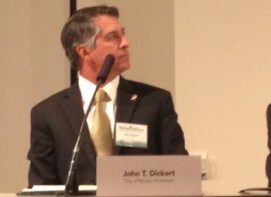Article written by Corrinne Hess, taken from the BizTimes website published October 23rd, 2015

Using a “Back to the Future” theme to illustrate his points, Racine Mayor John Dickert, challenged his colleagues to stop nitpicking at budgets and build a future for the next generation that will allow them to compete globally.
“We have an opportunity to build a plan that crosses three states to create the most efficient, effective, transportation mechanism in the world and compete globally,” Dickert said. “We actually have an opportunity to build a plan to build our future, so when our kids look back in 30 years, all the things we talked about are not a joke.”
Dickert spoke during a session on the “Future of North America’s largest transportation hub” at the third annual Summit on Regional Competitiveness Friday at the Federal Reserve Bank of Chicago.
The plan Dickert was referring to has been three years in the making and is housed at the University of Indiana-Purdue. It has to do with connecting 21 counties in southeastern Wisconsin, Chicago and Indiana by road, rail, air, port and commuter rail. Right now, it’s just a concept, that the mayors of the communities are on board with but that gets stuck when it moves through the ranks of the state’s governors, state legislators and federal bureaucrats, Dickert said.
“If accomplished this would be the first time in the United States anything like this is done,” Dickert said during an interview after his session Friday. “This is being done all over Europe.”
Dickert’s panel included the director of the Urban Transportation Center at the University of Illinois at Chicago, a vice president at Union Pacific and an executive vice president of Aviation Facilities Company, Inc.
The group discussed the Great Lakes Basin Railroad, which when complete, would operate on 275-miles between Janesville and Michigan City, Indiana to alleviate much of the traffic that goes through Chicago.
The project, however, is not the type of rail system that Dickert is hoping for. The Racine mayor said he would like to see more options for commuter rail.
“Our state right now is spending $350 to $400 million fixing roads and $500 million building new ones they can’t afford,” Dickert said. “We’ve got to get out of our box and be willing to give up some of our roads to rail.”
